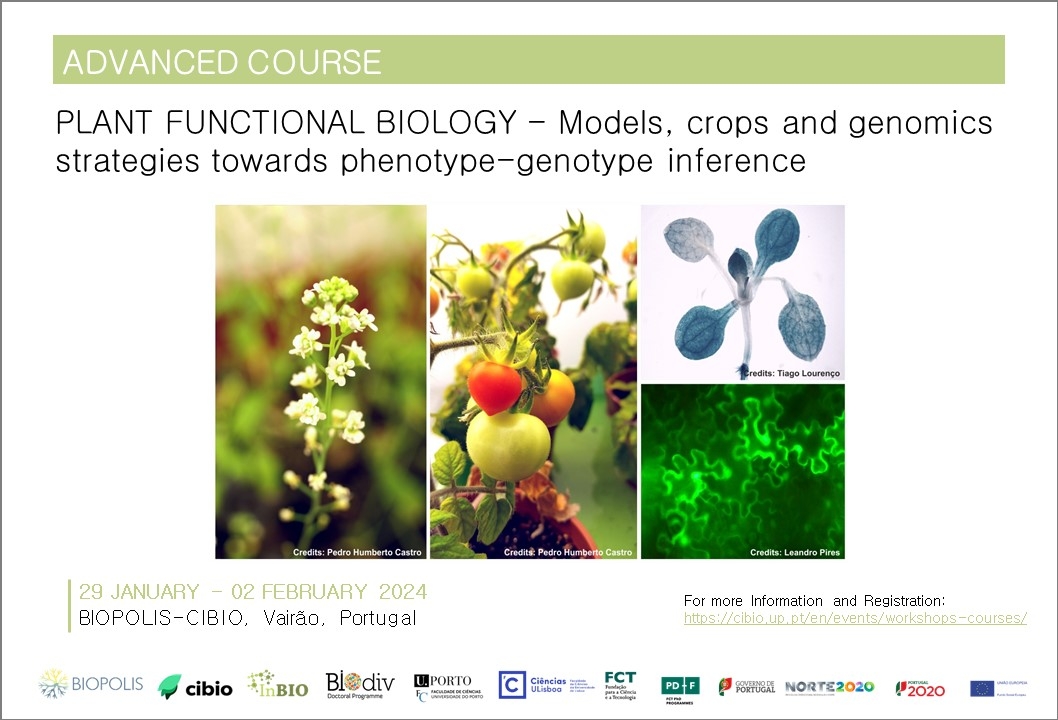PLANT FUNCTIONAL BIOLOGY - Models, crops and genomics strategies towards phenotype-genotype inference
From 29 Jan 2024 until 02 Feb 2024 - BIOPOLIS-CIBIO, Vairão, Portugal (Face-to-face)

Functional Biology intends to fully decipher and understand the molecular/biochemical mechanisms behind life. More particularly, how the flux of information encoded in genes is used/regulated to maintain the life of cells and organisms under constant environmental challenges. The Plant Functional Biology course will provide an updated overview of the strategies currently deployed towards phenotype-genotype associations in multiple aspects of Plant Science research (i.e. plant development, nutrition, environmental stress, pathogen infection, specialized metabolism), and is broadly divided around three topics:
1. Models. In this topic, we will emphasize Arabidopsis thaliana as a key model plant, and portrait the techniques and strategies that are currently at the forefront of gene functional characterization.
2. Crops. We will show-case the translation of methodologies and knowledge from models to crops, and overview and contextualize recent technological achievements (i.e. CRISPR/Cas9, and omics strategies) that bring added possibilities for gene function characterization in crops, empowering plant breeding.
3. Genomics strategies. Within this topic, we will discuss how next generation sequencing has enabled affordable genome-level approaches to make genotype-phenotype inference.
GOALS
- Understand the role of genes as key players in fundamental plant biological processes, namely plant development and production, plant nutrition and biofortification, specialized metabolism, resilience to climate change conditions, response to pathogens and environmental adaptation.
- Gain new expertise on the most sophisticated strategies for studying gene function in plant, crop and non-canonical models.
- Obtain critical technical know-how on genetic approaches best suited to studying genes in plants, including diverse omics (e.g. genomics, transcriptomics), genome editing, genetic engineering, plant biotechnology.
TARGET AUDIENCE
The course targets biological and agronomical sciences students.
Day 01 | January 29, 2024
[1. Models] – Introduction to Plant Functional Biology in models and crops
09.30-09.45 Course introduction
09.45-10.30 Lecture. Arabidopsis thaliana as a genetic model
10.30-11.00 Coffee Break
11.00-11.50 Lecture. The Arabidopsis thaliana functional toolkit
11.50-12.00 Short break
12.00-13.00 Lecture. Functional strategies for crops and non-model species
14.00-17.30 Practical-TP – Online tools, mutant search, primer design
Day 02 | January 30, 2024
[2. Models-Crops] – Plant development from models to crops
09.30-10.30 Lecture. Manuela Costa (CBMA, Univ. Minho, PT) - Flower asymmetry and the co-option of a genetic module during evolution
10.30-11.00 Coffee Break
11.00-11.50 Lecture. Ana Campilho (BIOPOLIS-CIBIO, Univ. Porto, PT) - Vascular development: from Arabidopsis to trees
11.50-12.00 Short break
12.00-13.00 Lecture. Ana Rita Seabra (BIOPOLIS-CIBIO, Univ. Porto, PT) - What lies beneath the development of root nodule endosymbiosis with nitrogen-fixing rhizobia
14.00-17.30 Practical-TP – Gene cloning strategy and transient transformation in plants
Day 03 | January 31, 2024
[2. Models-Crops] – Plant nutrition and biofortification
09.30-10.30 Lecture. Christian Dubos (IPSiM, INRAE, Univ. Montpellier, FR) - Deciphering the molecular mechanisms regulating iron homeostasis in plants using Arabidopsis thaliana as model
10.30-11.00 Coffee Break
11.00-11.50 Lecture. Ana Assunção (BIOPOLIS-CIBIO, Univ. Porto, PT) - Dealing with too little: The Zn Deficiency Response in land plants
11.50-12.00 Short break
12.00-13.00 Lecture. Pedro Humberto Castro (BIOPOLIS-CIBIO, Univ. Porto, PT) – Discovering the genetic players in iodine regulation in plants
14.00-17.30 Practical-TP – Transient expression of protein fused-FP and GUS staining assay
Day 04 | February 01, 2024
[2. Models-Crops] – Plant stress response in crops
09.30-10.30 Lecture. Miguel A. Botella (IHSM-LaMayora, Univ. Málaga, ES) - Cellulose biosynthesis in plants
10.30-11.00 Coffee Break
11.00-11.50 Lecture. Ana Margarida Fortes (BIOISI, FCUL, PT) - Integration of omics and genome editing technologies for studying necrotrophic and biotrophic fungal infections during fruit ripening
11.50-12.00 Short break
12.00-13.00 Lecture. Nelson Saibo (ITQB NOVA, PT) - Insights into the regulation and evolution of C4 photosynthesis
14.00-17.30 Practical-TP – Results analysis and discussion
Day 05 | February 02, 2024
[3. Unconventional plants] – Omics strategies
09.30-10.30 Lecture. Herlander Azevedo (BIOPOLIS-CIBIO, Univ. Porto, PT) – Breakthrough in Plant Genomics: From domestication to adaptation
10.30-11.00 Coffee Break
11.00-11.50 Lecture. Octávio Serra (BPGV-INIAV, PT) - Strategies and tools to uncover the genetic basis of key traits in Roseacea species
11.50-12.00 Short break
12.00-13.00 Lecture. Mariana Sottomayor (BIOPOLIS-CIBIO, Univ. Porto, PT) - Exploiting biological complexity to understand the metabolic flux of anticancer alkaloids in Catharanthus roseus
13.00-13.30 Closure.
--
15.30-16.30 – SEB - Viola Willemsen (Wageningen Univ., NL) - Shaping root architecture
PLACE
Face-to-face at CIBIO’s facilities:
- CIBIO Lab12 during the afternoon for practical classes;
- CIBIO auditorium during the morning for lectures;
- CIBIO classroom (A or B) for Thursday afternoon group work and discussions
COURSE INSTRUCTORS
Pedro Humberto Castro (Coordinator) | BIOPOLIS/CIBIO - PlantBIO
Ana Assunção | BIOPOLIS/CIBIO, Univ. Copenhagen
Ana Campilho | BIOPOLIS/CIBIO, FCUP
Herlander Azevedo | BIOPOLIS/CIBIO, FCUP
Ana Campilho | BIOPOLIS/CIBIO, FCUP
Herlander Azevedo | BIOPOLIS/CIBIO, FCUP
Mariana Sottomayor | BIOPOLIS/CIBIO, FCUP
SELECTION CRITERIA
The complete course (lectures + practical classes) will be open to a maximum number of 16 participants. Lectures have no maximum number of participants.
75% of available student slots are reserved for BIODIV students.
Priority will be given to:
• 1st year and other PhD students attending the BIODIV Doctoral Program;
• PhD students attending other courses;
• Other post-graduate students and researchers.
REGISTRATION
Complete Course: 75€ (students) | 200€ (other participants) - Registration closed
Lectures Only: 25€ (students & other participants) - Positions available - Application deadline: 19 January 2024
Participation is free of charge for BIODIV Students MBGE 1st year Students & CIBIO's TwinLabs
Registration fees do not include accommodation or meals
No ECTS credits are awarded for attending the course. Participants receive a certificate of attendance without quantitative evaluation
No ECTS credits are awarded for attending the course. Participants receive a certificate of attendance without quantitative evaluation
Application deadline: December 22, 2023
To apply, please fill the form available HERE
Financed by:
